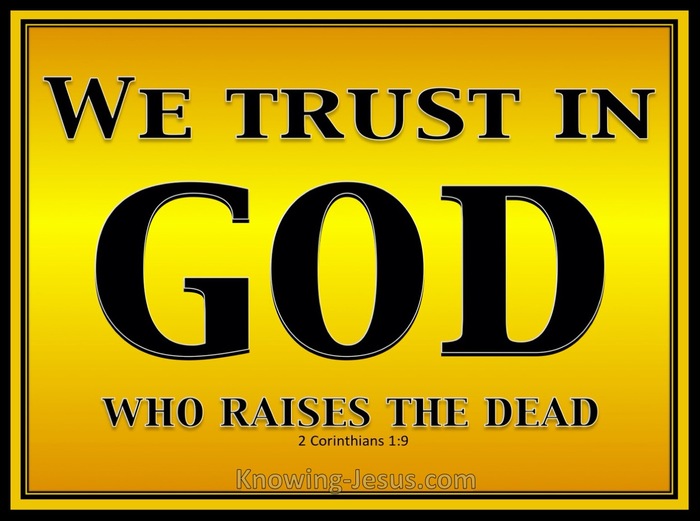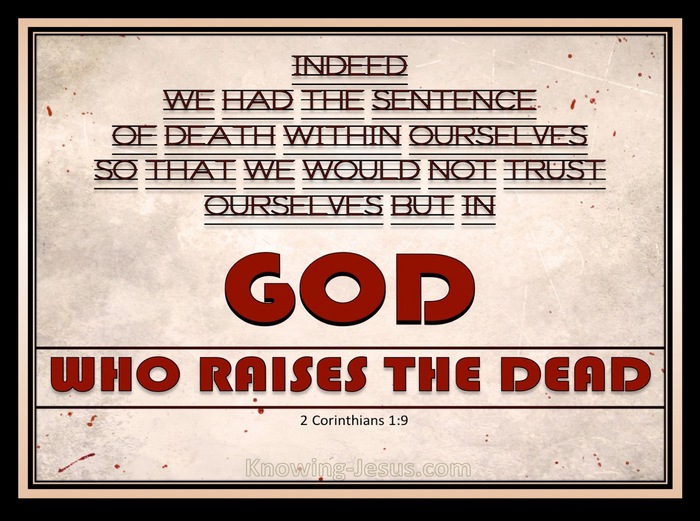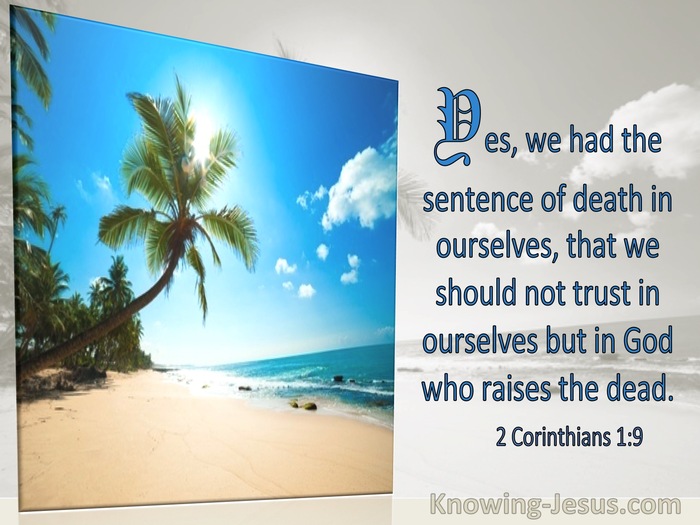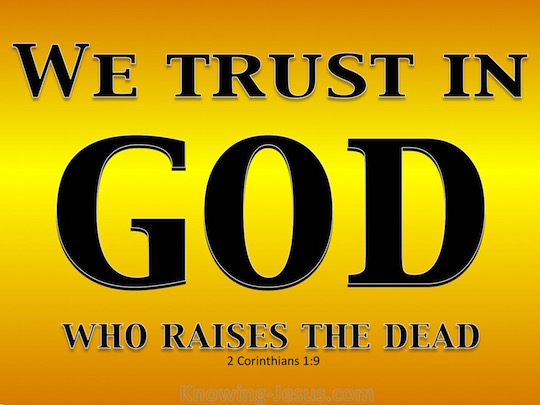Parallel Verses
Twentieth Century New Testament
Indeed, we had the presentiment that we must die, so that we might rely, not on ourselves, but on God who raises the dead.
New American Standard Bible
King James Version
But we had the sentence of death in ourselves, that we should not trust in ourselves, but in God which raiseth the dead:
Holman Bible
Indeed, we personally had a death sentence within ourselves, so that we would not trust in ourselves but in God
International Standard Version
In fact, we felt that we had received a death sentence so we would not rely on ourselves but on God, who raises the dead.
A Conservative Version
But we ourselves have had the sentence of death in ourselves, so that we should not be trusting in ourselves, but in God who raises the dead.
American Standard Version
yea, we ourselves have had the sentence of death within ourselves, that we should not trust in ourselves, but in God who raiseth the dead:
Amplified
Indeed, we felt within ourselves that we had received the sentence of death [and were convinced that we would die, but this happened] so that we would not trust in ourselves, but in God who raises the dead.
An Understandable Version
Actually, we felt within us that we had [already] received a death sentence, so that we could [learn] not to trust in ourselves but in God, who raises the dead.
Anderson New Testament
But we have in ourselves the sentence of death, that we may not trust in ourselves, but in God, who raises the dead;
Bible in Basic English
Yes, we ourselves have had the answer of death in ourselves, so that our hope might not be in ourselves, but in God who is able to give life to the dead:
Common New Testament
Indeed, we felt that we had received the sentence of death. But this happened that we might not rely on ourselves but on God, who raises the dead.
Daniel Mace New Testament
nay, I abandon'd my self to death, that I might not rely upon my self for deliverance, but on God who raiseth the dead.
Darby Translation
But we ourselves had the sentence of death in ourselves, that we should not have our trust in ourselves, but in God who raises the dead;
Godbey New Testament
but we had the answer of death in ourselves, in order that we might not trust in ourselves, but in God who raised the dead:
Goodspeed New Testament
Why, I felt in my heart that the end must be death. That was to keep me from relying on myself instead of on God, who can even raise the dead.
John Wesley New Testament
Yea, we had the sentence of death in ourselves, that we might not trust in ourselves, but in God, who raiseth the dead:
Julia Smith Translation
And we ourselves have had the sentence of death in ourselves, that we should not have trusted in ourselves, but in God raising the dead:
King James 2000
But we had the sentence of death in ourselves, that we should not trust in ourselves, but in God who raises the dead:
Lexham Expanded Bible
But [we] ourselves had the sentence of death in ourselves, so that we would not be putting confidence in ourselves, but in God who raises the dead,
Modern King James verseion
But we had the sentence of death in ourselves, so that we should not trust in ourselves, but in God who raises the dead;
Modern Spelling Tyndale-Coverdale
Also we received an answer of death in ourselves, and that was done because we should not put our trust in ourselves, but in God, which raiseth the dead to life again -
Moffatt New Testament
in fact I told myself it was the sentence of death. But that was to make me rely not on myself but on the God who raises the dead;
Montgomery New Testament
Indeed, I had in myself, and still have, the sentence of death, in order that I might not rely on myself, but on God who raises the dead to life.
NET Bible
Indeed we felt as if the sentence of death had been passed against us, so that we would not trust in ourselves but in God who raises the dead.
New Heart English Bible
Yes, we ourselves have had the sentence of death within ourselves, that we should not trust in ourselves, but in God who raises the dead,
Noyes New Testament
yea, we ourselves had within ourselves the sentence of death, that we might not trust in ourselves, but in God who raiseth the dead;
Sawyer New Testament
but we had the sentence of death in ourselves, that we might not trust in ourselves, but in God who raises the dead,
The Emphasized Bible
But, we ourselves, within ourselves, have had the sentence of death, that we might not rest our confidence upon ourselves, but upon God, who raiseth the dead,
Thomas Haweis New Testament
for we ourselves, in ourselves have received the sentence of death, that we should have no confidence in ourselves, but in God who raiseth the dead.
Webster
But we had the sentence of death in ourselves, that we should not trust in ourselves, but in God who raiseth the dead:
Weymouth New Testament
Nay, we had, as we still have, the sentence of death within our own selves, in order that our confidence may repose, not on ourselves, but on God who raised the dead to life.
Williams New Testament
Yes, I felt within my very self the sentence of death, to keep me from depending on myself instead of God who raises the dead.
World English Bible
Yes, we ourselves have had the sentence of death within ourselves, that we should not trust in ourselves, but in God who raises the dead,
Worrell New Testament
yea, we ourselves had in ourselves the sentence of death, that we should not trust in ourselves, but in God, Who raiseth the dead;
Worsley New Testament
but we had the sentence of death within ourselves, that we might not trust in ourselves, but in God who raiseth the dead:
Youngs Literal Translation
but we ourselves in ourselves the sentence of the death have had, that we may not be trusting on ourselves, but on God, who is raising the dead,
Themes
Afflicted saints » Should trust in the goodness of God
Prayer » Answered » Paul, to be restored to health
Resurrection » God resurrecting the dead
Topics
Interlinear
En
ἐπί
Epi
ἐπί
Epi
Usage: 644
Usage: 644
heautou
ἑαυτοῦ
heautou
himself, themselves, yourselves, ourselves, his, their, itself,
Usage: 249
me
Devotionals
Devotionals about 2 Corinthians 1:9
Devotionals containing 2 Corinthians 1:9
References
Word Count of 37 Translations in 2 Corinthians 1:9
Prayers for 2 Corinthians 1:9
Verse Info
Context Readings
God Rescued Paul When He Was Suffering
8 We want you, Brothers, to know that, in the troubles which befell us in Roman Asia, we were burdened altogether beyond our strength, so much so that we even despaired of life. 9 Indeed, we had the presentiment that we must die, so that we might rely, not on ourselves, but on God who raises the dead. 10 And from so imminent a death God delivered us, and will deliver us again; for in him we have placed our hopes of future deliverance, while you, also, help us by your prayers.
Names
Cross References
Luke 18:9
Another time, speaking to people who were satisfied that they were religious, and who regarded every one else with scorn, Jesus told this parable--
Romans 4:17-25
As Scripture says-'I have made thee the Father of many nations.') And this they do in the sight of that God in whom Abraham had faith, and who gives life to the dead, and speaks of what does not yet exist as if it did.
2 Corinthians 3:5
I do not mean that we are fit to form any judgment by ourselves, as if on our own authority;
2 Corinthians 4:7
This treasure we have in these earthen vessels, that its all- prevailing power may be seen to come from God, and not to be our own.
2 Corinthians 4:13-14
But, in the same spirit of faith as that expressed in the words--'I believed, and therefore I spoke,' we, also believe, and therefore speak.
2 Corinthians 12:7-10
It was for this reason, and to prevent my thinking too highly of myself, that a thorn was sent to pierce my flesh--an instrument of Satan to discipline me--so that I should not think too highly of myself.
Hebrews 11:19
For he argued that God was able even to raise a man from the dead--and indeed, figuratively speaking, Abraham did receive Isaac back from the dead.






